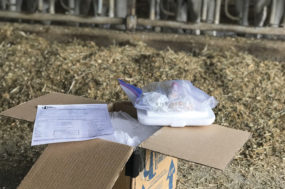The National Milk Producers Federation urges Congress to create a federal labeling standard for foods produced with biotechnology. A comment period on organic livestock management rules is extended. A U.S. Supreme Court ruling on ‘waters of the U.S.’ is seen as a win for landowners. This and other U.S. dairy policy news can be found here.
NMPF board seeks federal biotech labeling standard
The chairman of the National Milk Producers Federation (NMPF) urged Congress to establish a federal standard preempting state mandates related to labels on foods produced through biotechnology.
A labeling law in Vermont, set to take effect in July, will require labels identifying foods produced with genetically modified organism (GMOs). The law will potentially trigger implementation of similar rules in other states.
The House of Representatives has already passed its own version of a federal GMO labeling preemption, but the food industry is waiting on the Senate to act so that a single, uniform law can be implemented in 2016.
At its summer meeting, the NMPF board said the Vermont law is already causing disruptions in the marketplace, and proliferation of individual state laws will severely harm farmers by threatening the continued utilization of agricultural biotechnology.
“Plants produced through biotechnology not only are completely safe for consumers, they also improve our environment by reducing energy, water and pesticide use,” said Randy Mooney, NMPF chairman and a dairy farmer from Rogersville, Missouri. “Farmers have overwhelmingly adopted these crop technologies because they increase productivity while enhancing agricultural sustainability.”
The NMPF resolution also affirmed the importance of federal policy making clear that milk and meat from animals that consume GM feed are not subject to biotech labeling disclosure because the animal products are in no way genetically modified.
“There is no difference in milk or meat from cows that have consumed biotech crops, and that’s why any federal labeling disclosure needs to ensure the common-sense treatment of animal feed,” Mooney said.
Comment deadline extended on proposed organic livestock practices rules
USDA’s Agricultural Marketing Service (AMS) has extended the comment period for proposed rules regarding livestock and poultry management practices under federal organic regulations. The extended comment period now closes July 13.
Access the organic livestock and poultry proposed rule.
The proposed changes, based on recommendations by the National Organic Standards Board (NOSB), were published in the Federal Register on April 13. While many changes address poultry production, provisions covering dairy include the prohibition of tail docking, prohibition of hormones to enhance production or reproduction, and required active monitoring and recording of lameness. Allowable methods of euthanasia are identified.
The proposal sets housing requirements for dairy young stock, allowing individual housing for pre-weaned animals as long as they have sufficient room to turn around, lie down, stretch and groom themselves. They also must be able to see, smell and hear other animals.
Group housing and access to the outdoors are required post-weaning.
Milk from animals treated with an allowed substance with a prescribed withholding time may not be sold or labeled as organic, but it can be fed to the cow’s own offspring without loss of the calf’s organic status.
Read: USDA issues proposed organic animal standards revisions
WOTUS ruling seen as landowner victory
A unanimous U.S. Supreme Court ruling in a lawsuit over U.S. Army Corps of Engineers' (COE) administration of “waters of the U.S.” (WOTUS) regulations is being called a major victory by agricultural organizations. The ruling in the case, United States Army Corps of Engineers v. Hawkes Co. Inc. (PDF, 125KB), was issued May 31.
The Supreme Court ruling centered on a decision by the Corps that property in Minnesota owned by the Hawkes Company contained wetlands subject to the Clean Water Act (CWA). Hawkes planned to mine peat on the property, subject to compliance under Minnesota regulations.
According to Texas Agricultural Law, COE issued an “approved jurisdictional determination” finding that 150 of the Hawkes’ 530 acres were governed by the CWA, because its wetlands had a “significant nexus” to the Red River of the North, located 120 miles away.
An approved jurisdictional determination is a definitive finding by the U.S. Environmental Protection Agency (EPA) or COE, and is binding on both the agencies and the parties for five years.
According to the Ohio State University Agricultural Law and Taxation Blog, Hawkes challenged COE in federal district court. COE asserted Hawkes should apply for a CWA permit and challenge the results of the permit request if dissatisfied, or should proceed without a permit and challenge the jurisdictional determination in a likely enforcement action.
According to Texas Ag Law, that left Hawkes with three alternatives: Abandon the project; proceed without a permit and face possible criminal and civil penalties, including fines of up to $37,500 per day; or seek a discharge permit, costly in both time and money. For a permit similar to the one at issue in this case, the average applicant waits over two years and spends more than $270,000 completing the permitting process. Even in less complex situations where a general permit may be obtained, the average wait is nearly one year and the price tag is more than $28,000.
The federal district court agreed with COE and dismissed the case. Hawkes then appealed to the Eighth Circuit Court of Appeals, which reversed the district court’s decision. COE requested review of the appeal by the U.S. Supreme Court.
The Supreme Court concluded the COE’s jurisdictional determination is appealable under the federal Administrative Procedures Act. According to Texas Ag Law, the ruling and concurring opinions also have implications for other WOTUS-related cases making their way through the courts.
Read: Unanimous Victory in United States Supreme Court for Landowners PD

-
Dave Natzke
- Editor
- Progressive Dairyman
- Email Dave Natzke




